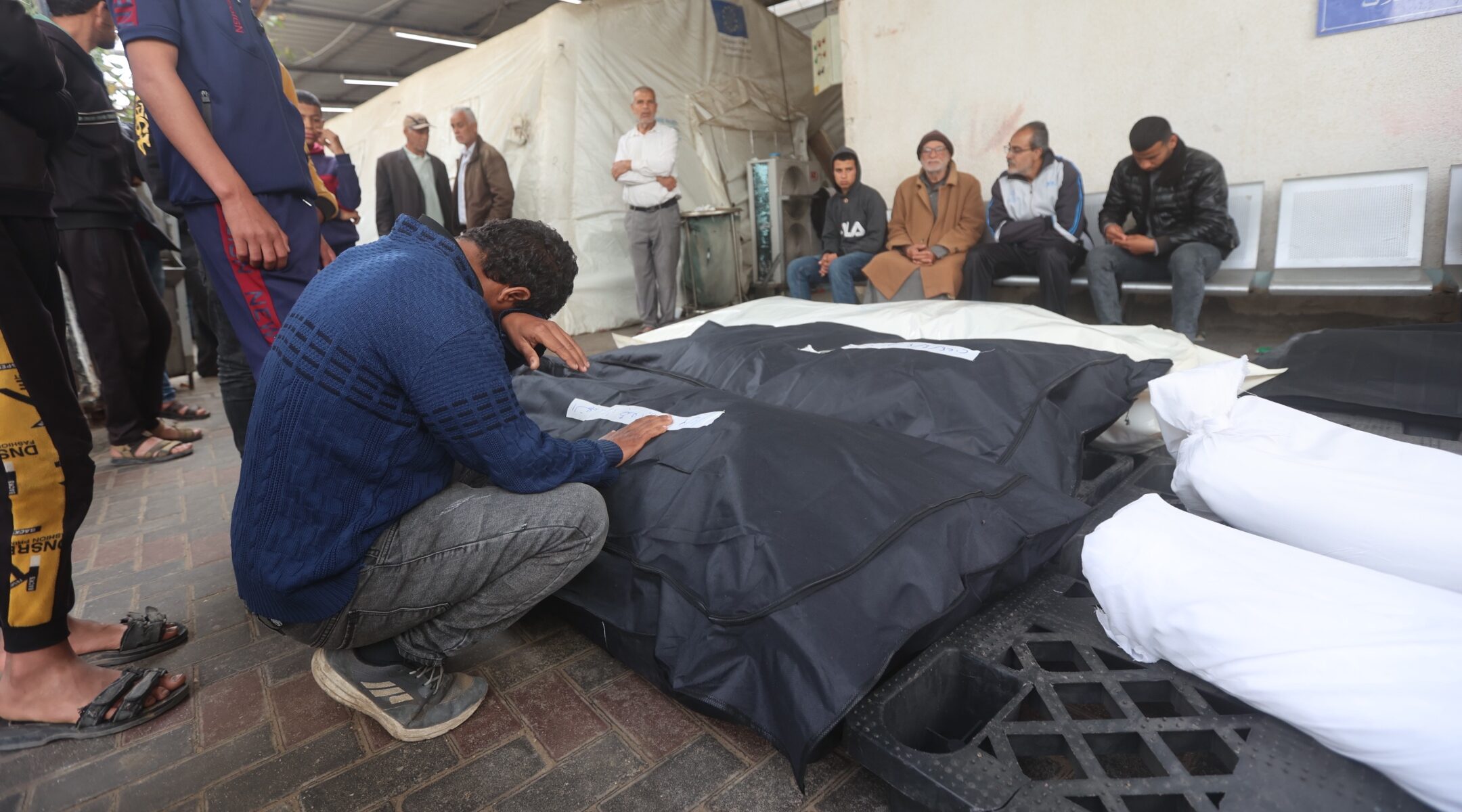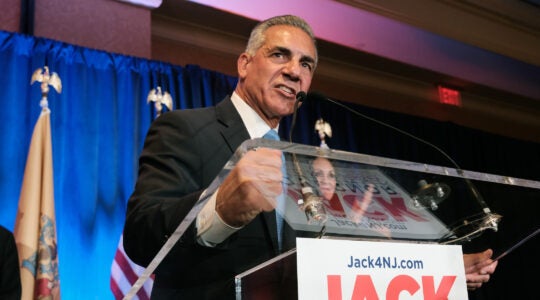WASHINGTON (JTA) — In the three days since an Israeli strike killed seven aid workers in Gaza, the prime minister has said he “deeply regrets” the incident, the defense minister has expressed his “sorrow and condolences,” the chief of the military has said sorry for the “grave mistake” and the president has personally apologized to the founder of the aid organization.
The contrition has included changes in policy: Following the bombing of trucks belonging to World Central Kitchen, Israel vowed to investigate the incident and created a channel for aid groups to communicate directly with the Israeli military’s commanders in Gaza, rather than via another division.
“The IDF works together closely with the World Central Kitchen and greatly appreciates the important work that they do,” Israel Defense Forces Chief of Staff Herzi Halevi said in a rare English-language address. “We will continue taking immediate actions to ensure that more is done to protect humanitarian aid workers. This was a grave mistake.”
For nearly all of the war, Israel has faced mounting global pressure over the rising death toll in Gaza — which includes nearly 200 aid workers, according to the United Nations. Israel has investigated previous strikes, but in the six months since the fighting began, it has rarely been this apologetic, via so many channels, over a single incident.
The difference, according to humanitarian activists and longtime analysts of Israel, stems from a combination of factors: warnings of impending famine in Gaza; the international renown — and sympathy for Israel — of World Central Kitchen’s founder, chef Jose Andres; outrage from the Biden administration; and the fact that nearly all of the aid workers killed were internationals, rather than Palestinians.
Altogether, Israel’s response to the bombing — and the condemnations it has weathered — may mark a turning point in how responsive Israeli Prime Minister Benjamin Netanyahu’s government is to outside pressure over the war.
“It’s got the whole world’s attention, a prominent personality involved, expatriates killed,” said Larry Garber, a onetime mission director for the U.S. Agency for International Development in the West Bank and the Gaza Strip. “It will create more pressure on Israel to open more points of entry into Gaza so that things can get closer to the places they need to get without running the risks they now do.”
Israel’s vows to investigate and change policy came in response to unprecedented condemnations from President Joe Biden, who said he was “outraged and heartbroken” over the deaths. In a call with Netanyahu on Thursday, he “made clear the need for Israel to announce and implement a series of specific, concrete, and measurable steps to address civilian harm, humanitarian suffering, and the safety of aid workers,” according to a readout. Biden, who has so far staunchly supported Israel’s war aims, also suggested his administration could rethink its policy on the conflict, which he said would “be determined by our assessment of Israel’s immediate action on these steps.”
Adding onto the pressure are reports from world health officials saying Gaza is on the verge of a famine, along with increasing calls for Israel to do more to let in aid. The strike on the aid workers has exacerbated that crisis, as World Central Kitchen and Anera, another aid group, have suspended operations in Gaza out of fear for their workers’ safety.
“We have been trying to wave a big red flag for weeks that there is a human network and a human infrastructure to the delivery of aid in a reliable, safe, organized way and if that falls apart, you can’t recreate that quickly,” Rebecca Abou-Chedid, a board member of Anera, told the Jewish Telegraphic Agency.
She said quick fixes, such as air drops and a pier that the U.S. military is building on Gaza’s shore, were inadequate to meet the crisis.
Added onto that, she said, were fears that the group’s staff would be killed. On March 8, Moussa Shawa, Anera’s logistics coordinator, was killed when a bomb hit a shelter Anera understood to be deconflicted, or understood to be safe from combat. His 6-year-old son, Karim, was injured in the blast and died 10 days later.
“For us in the U.S., it’s a ritual,” she said. “We wake up every day and ask, is everybody accounted for, is everybody safe? It’s a constant: Somebody’s phone ran out of power, so we can’t locate them — what does that mean?”
American Jewish groups that have supported Israel over the course of the war also mourned the deaths, and Abe Foxman, the former CEO of the Anti-Defamation League, said he expected Israel to become more engaged with humanitarian organizations following the strike.
“Israel will sound and act more proactive on the humanitarian front, and be more public about it,” he said.
Garber, who communicated with the IDF when he was administering USAID operations, said a more direct line of communication between humanitarian relief groups and the offensive command in Gaza was a no-brainer during a war.
The humanitarian organizations “should be, if they’re not already, given direct access to Southern Command,” he said, referring to the division in charge of Gaza. If an aid convoy is passing, he said, “Southern Command should know that this has been approved and once it’s been approved, all units should be on notice that you can’t fire on them regardless of who’s in them, certainly without getting top-level clearance.”
Israel has insisted for months that it is letting as much aid through in a secure manner as possible, and that Hamas is stealing aid meant for civilians. But several incidents have led even Israel’s allies to doubt that it is adequately addressing the crisis, including an incident in which donzens died in a stampede to access an aid convoy (for which Israel denies responsibility). Groups of right-wing Israelis have also tried to block humanitarian aid from entering the enclave.
David Makovsky, a fellow at the Washington Institute for Near East Policy, said the strike killing the relief workers was emblematic of how politics are muddying what should be closer coordination between the White House and Israel in all areas, including the distribution of humanitarian assistance. Biden is facing pressure from the left, and increasingly the center, to be harder on Israel, while Netanyahu is contending with the far-right leaders he included in his government.
“The political dynamics in both countries — being an election year in the U.S., and the coalition dynamics in Israel — all seem to exacerbate tensions when there needs to be a sense of a reaffirmation of the convergence” of Israeli and American strategies, said Makovsky, who meets regularly with top officials in the U.S. and Israeli governments. “The points of difference are exacerbated because Israel is not seen as going the extra mile.”
The dynamics of the relationship may change this week, and humanitarian workers hope more aid will go through. But Abou-Chedid said it isn’t enough to act only when foreign workers are killed. She said Anera’s entirely Palestinian staff needed to know that risks to Palestinian civilians and aid workers would also be mitigated.
“There is a lot of heat and the Israelis and they clearly know that this was not an acceptable mistake,” she said. “But there wasn’t the same attention when a Palestinian was killed. Our aid workers are Palestinian. And so we need to make sure that there is a sustained, understood deconfliction system.”
JTA has documented Jewish history in real-time for over a century. Keep our journalism strong by joining us in supporting independent, award-winning reporting.






